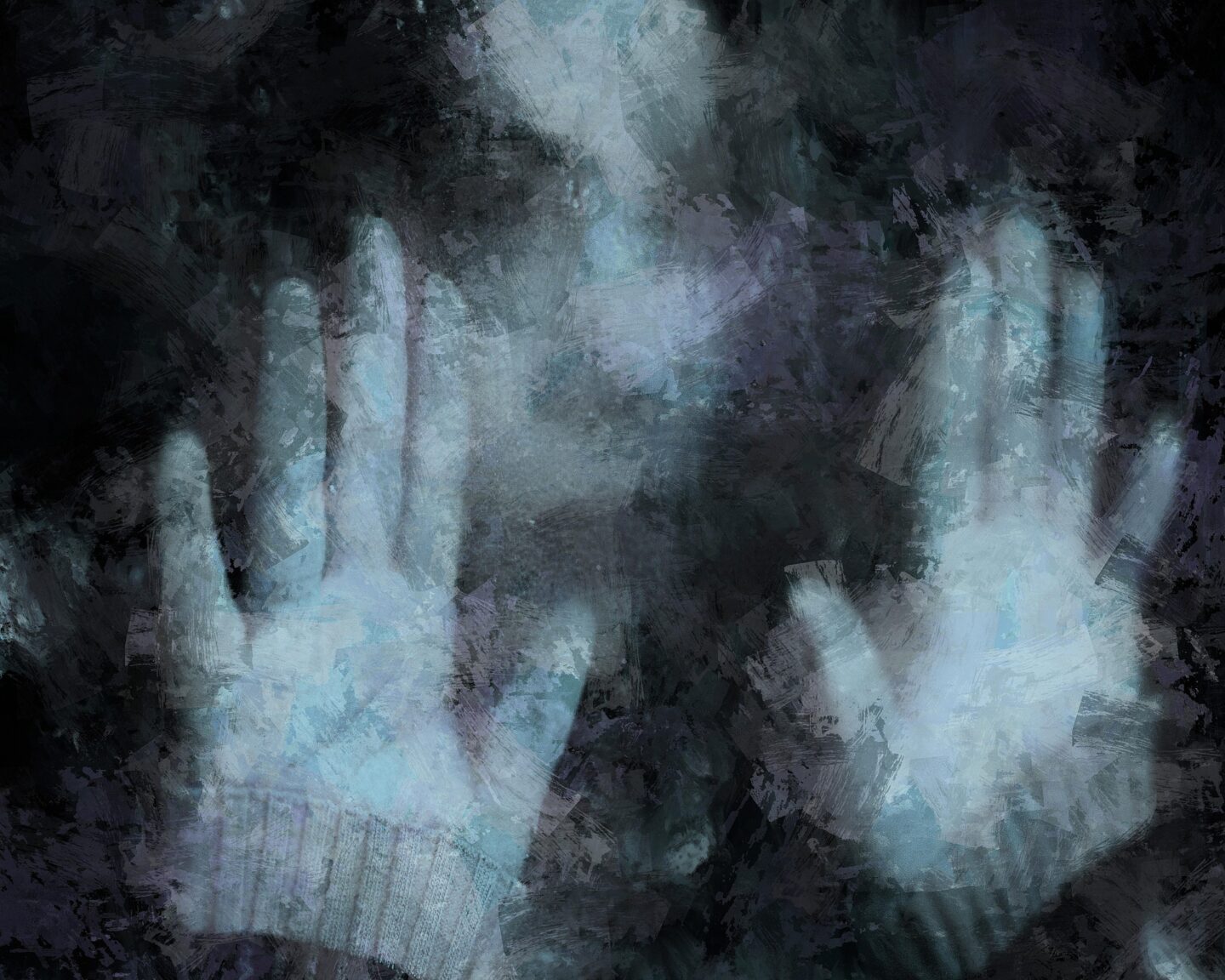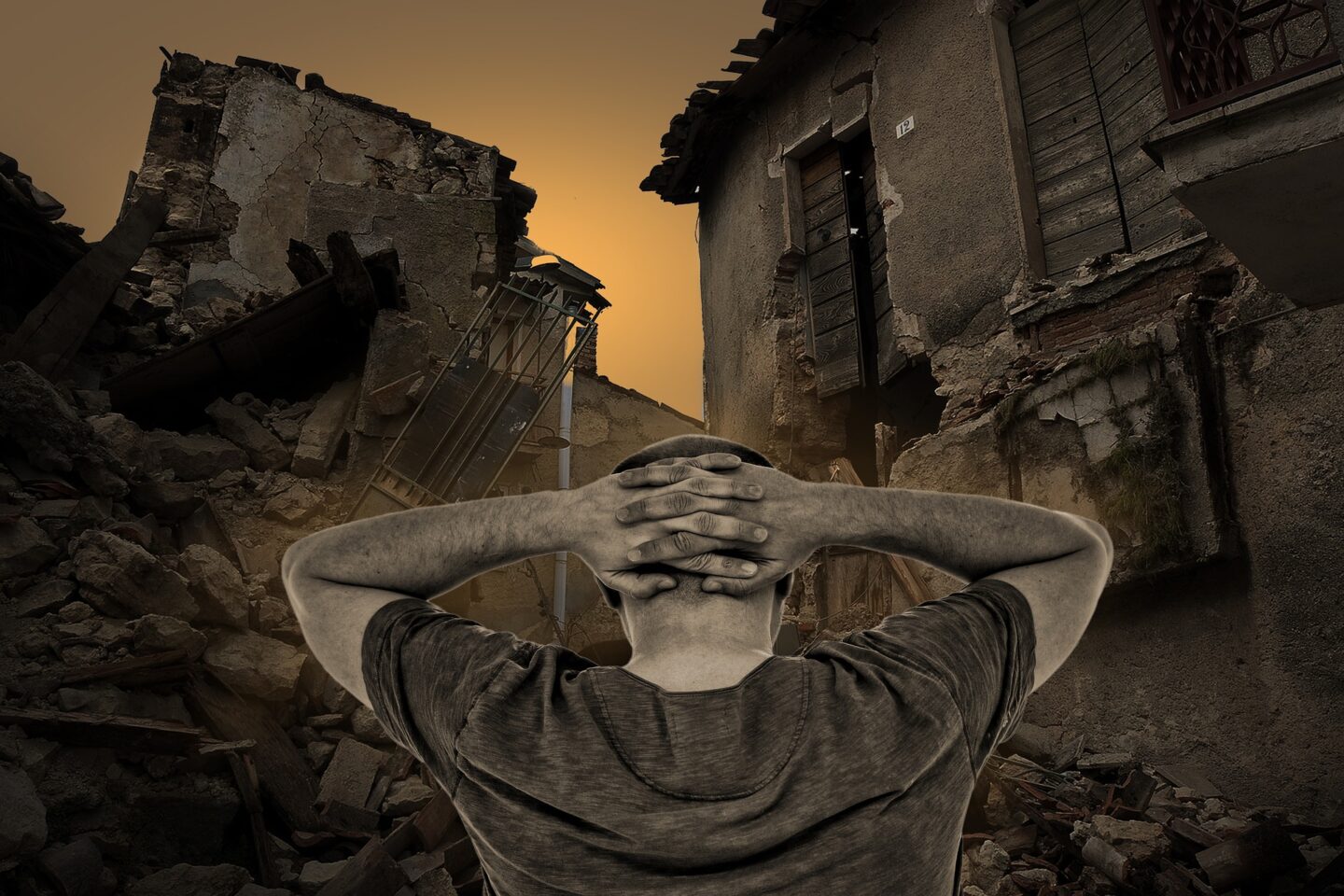By Ahmed Saleh
The Palestinian poet, editor, and translator paints a vivid and starkly personal portrait of life as a permanent exile.

In a warm office in a cold country, with breathtaking views from my desk now, I drift into the depth of a vacant mind, to where my family spends its life in a tattered tent in the largest refugee camp in the world, in southern Gaza. They are stuck on a hot tin roof, riding a tank, falling like sacrificial animals at the distance of a warplane.
As for me, I am here, cast upon the humiliating sidewalks of exile, waiting for someone to grant me a kiss and an alternate homeland.
Reflection on the Word “Refugee”
Refugee: a word that seems simple at first glance, the result of continuous manipulation of consciousness through propaganda tools, which seek to trivialize this experience and bypass the depicted human defeat in the media of global powers. These messages are part of a brutal process that has produced millions of refugees, stripped of identity and homeland, with a distorted memory that reduces them to numbers in asylum registers and immigration systems.
When a refugee becomes a number, it is easy to strip away their complexities. It becomes easier to ignore their history and their identity, and to turn their pain into something manageable, treated as a homogeneous mass that can be addressed with superficial solutions, relieving the system of any responsibility for their accumulated personal tragedies.
In her writings on refugees Hannah Arendt emphasized how governments and politicians reduce individuals’ identity to exploit their suffering for electoral gain and escape the complexities of the refugees’ daily realities. Once such a disaster is hidden behind cold statistics it becomes easier to handle and keep from delving into the horrifying details behind the numbers. Instead, these impersonal statistics are turned into a means of soothing the collective conscience and avoiding the need to explore individual details.
However, when you reflect on the word “refugee,” it unveils more bitter dimensions. It hides within chaotic meanings from which a person emerges, stripped of their essence and original image, which we know as “identity,” suffocating with psychological illnesses they cannot fully grasp. In this painful and arduous journey, they find themselves surrounded by restless ghosts, gradually fading under the weight of pain and fragmentation.
So, what do you know about me? Was I Palestinian, Syrian, Iraqi, Afghan, Sudanese, or Yemeni? What do you know about me other than death?
Can a Refugee Be Optimistic?
I grew up carrying a number, a number that defines us as documented, classified human beings. This number, as much as it was a symbol of a distorted identity, was also a reduction of our human value that others see only from the margins. “Record, I am Arab, and my ID number is fifty thousand,” Darwish shouts at me with his famous phrase from the first cry I made in the cradle. The blue UNRWA card was part of my personal identity, one whose validity no one dared question. I carried it on my shoulder, documenting a complicated belonging to a country I knew only through horrifying stories, massacres, and human slaughterhouses, upon which my family, friends, city, and memory hung like sacrificial offerings.

I stood in the school line among my peers, singing songs about a homeland I had never seen, a homeland stuck between the pages of books and barbed wires. “My country, my country, my country, to you my love and heart,” I sang hesitantly, joyfully, and energetically, crying and sluggish, until I grew up and, terrified, carried it in a leather bag to another country, hoping to obtain identity and a passport. But they replaced it with another color, orange, an “Orange Card” bearing the same number, and told me: come here, come to the stable and run without asking about identity.
I think that if I want in the future to write a biography of my life, it should surely begin with the corpses I have seen throughout my life. Every question that has remained in my mouth without answers, for a person who spent his life searching for meaning in the waiting in lines of salvation and asylum. In his book Man’s Search for Meaning Viktor Frankl says: “I dare say that there is nothing in the world that can help a person as much, even in the worst circumstances, as knowing that there is meaning in his life.”
Exile: A State of Continuously Falling*
A person is nothing but memories, through accumulation. Memories carry our past to discover the present and foresee the future. Through these memories the meaning of our existence is formed, and life emerges, caught in a gap between “what is” and “what should be.”
But what if this gap shatters? What if memory stops granting the meaning that supports our existence? That’s when one falls into a terrifying void, not knowing where to begin or end.
After three months of my arrival in Belgium, as the fortunate one in my family, I believed that I had gained a new opportunity for life. Yet the moment I began to adapt to my new space, the massacre in Gaza broke out. I woke up to a bitter loss in which I lost everything that had kept me from leaving. I lost a part of my being that I thought was untouchable: memory.
Exile is not just a movement from one place to another, crossing geography; it is a form of rupture. The refugee becomes a stranger everywhere, moving between fragmented identities, not knowing how to shape them.
Hannah Arendt’s words remind us: “Human rights lose all significance as soon as an individual loses [their] political context.” Here, it becomes clear that exile is not just the absence of geography; it is the absence of the community that grants the subjects their identity and meaning. The refugee’s existence becomes suspended, hanging in a void no one recognizes, empty of everything that guarantees them an identity and rights.
The distorted identity that the refugee lives with is not just an imbalance: It is a continuous state of loss, of grieving. It is a collection of shattered memories. Of questions that remain unanswered, of a life torn apart and unable to return to its natural course. Refugees hold only fragments of ourselves, trying to rebuild our lives with inadequate new identities in a society that does not recognize our existence, in a permanent void of meaning.
From Alienation to Homelessness
You don’t have to live in the streets to be homeless. That definition subjects a person to superficial concepts and ignores a deeper reality. Even if you work, live in a house with loved ones, make new friends, and enjoy a social life, you may still be homeless: homeless as a state of total separation from your identity, without documents, without a homeland to return to. Homeless from the ability to define your place in the world.
Feelings of alienation do not stop at physical borders but extend to the absence of the ability to move freely outside the geographical framework you are being forced to accept. In this reality a person becomes trapped within narrow definitions, while still suspended on a cross without prophecy.
The sun is warm and the night is cold, and neither compensates the wounded body for its burning. I receive endless shocks and return at night like an exhausted and drained dog, licking the blood from the walls and sidewalks. Day after day I crawl, confused and scared, to my place of residence where the smell of exile lingers. And I don’t feel as though I’ve ever lived at all.
Palestinian writer, poet, editor, and translator Ahmed Saleh is situated in Belgium but trying to bring his family members to safety from the ongoing genocidal nightmare in Gaza. He is among our many Ecoversities relatives whose situation is increasingly desperate and precarious. If you visit our home page and scroll down to “Mutual Aid” you can read more and learn how to help.


